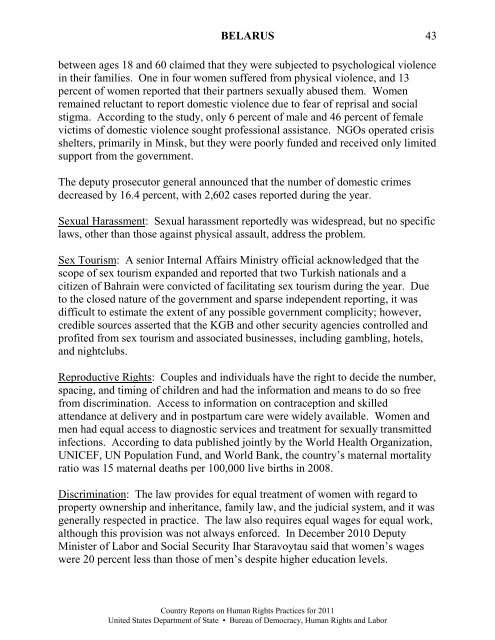belarus executive summary - US Department of State
belarus executive summary - US Department of State
belarus executive summary - US Department of State
You also want an ePaper? Increase the reach of your titles
YUMPU automatically turns print PDFs into web optimized ePapers that Google loves.
BELAR<strong>US</strong> 43<br />
between ages 18 and 60 claimed that they were subjected to psychological violence<br />
in their families. One in four women suffered from physical violence, and 13<br />
percent <strong>of</strong> women reported that their partners sexually abused them. Women<br />
remained reluctant to report domestic violence due to fear <strong>of</strong> reprisal and social<br />
stigma. According to the study, only 6 percent <strong>of</strong> male and 46 percent <strong>of</strong> female<br />
victims <strong>of</strong> domestic violence sought pr<strong>of</strong>essional assistance. NGOs operated crisis<br />
shelters, primarily in Minsk, but they were poorly funded and received only limited<br />
support from the government.<br />
The deputy prosecutor general announced that the number <strong>of</strong> domestic crimes<br />
decreased by 16.4 percent, with 2,602 cases reported during the year.<br />
Sexual Harassment: Sexual harassment reportedly was widespread, but no specific<br />
laws, other than those against physical assault, address the problem.<br />
Sex Tourism: A senior Internal Affairs Ministry <strong>of</strong>ficial acknowledged that the<br />
scope <strong>of</strong> sex tourism expanded and reported that two Turkish nationals and a<br />
citizen <strong>of</strong> Bahrain were convicted <strong>of</strong> facilitating sex tourism during the year. Due<br />
to the closed nature <strong>of</strong> the government and sparse independent reporting, it was<br />
difficult to estimate the extent <strong>of</strong> any possible government complicity; however,<br />
credible sources asserted that the KGB and other security agencies controlled and<br />
pr<strong>of</strong>ited from sex tourism and associated businesses, including gambling, hotels,<br />
and nightclubs.<br />
Reproductive Rights: Couples and individuals have the right to decide the number,<br />
spacing, and timing <strong>of</strong> children and had the information and means to do so free<br />
from discrimination. Access to information on contraception and skilled<br />
attendance at delivery and in postpartum care were widely available. Women and<br />
men had equal access to diagnostic services and treatment for sexually transmitted<br />
infections. According to data published jointly by the World Health Organization,<br />
UNICEF, UN Population Fund, and World Bank, the country’s maternal mortality<br />
ratio was 15 maternal deaths per 100,000 live births in 2008.<br />
Discrimination: The law provides for equal treatment <strong>of</strong> women with regard to<br />
property ownership and inheritance, family law, and the judicial system, and it was<br />
generally respected in practice. The law also requires equal wages for equal work,<br />
although this provision was not always enforced. In December 2010 Deputy<br />
Minister <strong>of</strong> Labor and Social Security Ihar Staravoytau said that women’s wages<br />
were 20 percent less than those <strong>of</strong> men’s despite higher education levels.<br />
Country Reports on Human Rights Practices for 2011<br />
United <strong>State</strong>s <strong>Department</strong> <strong>of</strong> <strong>State</strong> • Bureau <strong>of</strong> Democracy, Human Rights and Labor
















